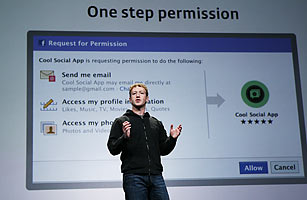
Facebook's history with privacy should be a familar one by now: push users toward sharing more (whether they're willing or not, in some cases) and then give them privacy controls only when they complain loudly enough. The narrative wasn't different in 2010. In April, Facebook rolled out a new system called the Open Graph, creating the now-ubiquatous "Like" button, allowing users to share their interests from around the Web. The only problem? These interests were awfully hard to hide. That, coupled with automatically opting users into a new "Instant Personalization" feature on certain third-party websites, led to a user revolt and murmers of an FCC investigation. Zuckerberg quashed the uprising in June by unveiling revisions to Facebook's privacy controls, making it easier for users to finely-tune what information they make public.